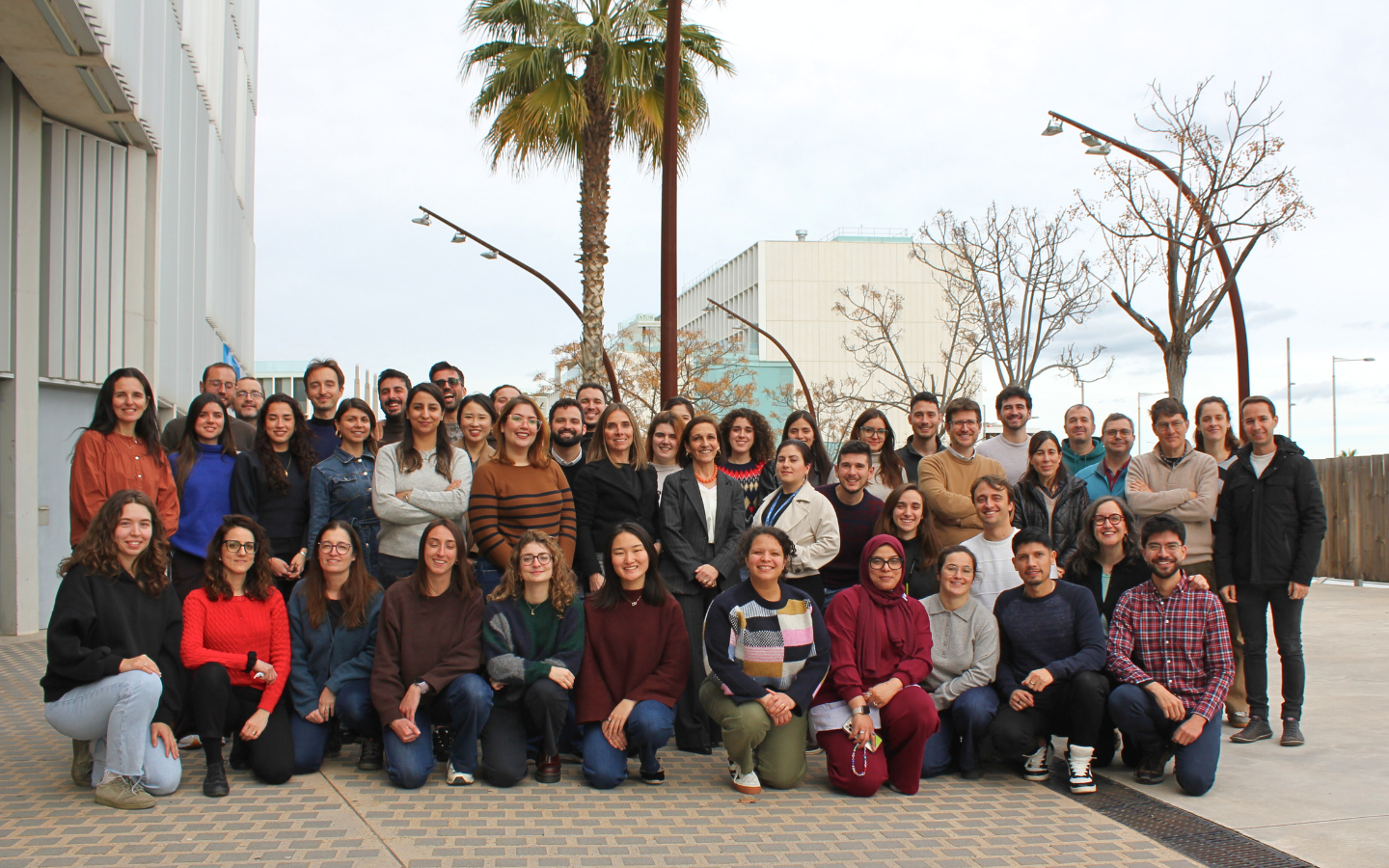Medical technologies: Biomaterials and Tissue Engineering
Research Program
Leaders
Where we are
 Centre de Recerca en Enginyeria Biomèdica (CREB) UPC
Centre de Recerca en Enginyeria Biomèdica (CREB) UPC
Related websites
The Biomaterials, Biomechanics and Tissue Engineering (BBT) research group at the Department of Science and Materials Engineering (CEM) of the Universitat Politècnica de Catalunya (UPC) is a designated consolidated research group by the Government of Catalonia, based in Barcelona East School of Engineering (EEBE).
The main mission of the BBT research group is to develop biomaterials for organ and tissue regeneration and/or functional repair. This calls for the design of materials capable of modulating the biological response of host tissue, leading to the regeneration and neoformation of damaged tissues in some cases, or to the perfect integration of the biomaterial and full recovery of functional loss. To accomplish this, the group combines expertise with a meticulous physical/chemical/mechanical characterisation of various materials, including in-depth material/tissue interactions studies. Surface characterisation of materials and how these properties affect biological response are therefore of particular relevance. This requires a highly multidisciplinary approach, which means that bridges must be built between two well-differentiated knowledge areas: materials science and biomedicine, and this is clearly reflected in the interdisciplinary make up of our group.
With the research carried out by the BBT group, our aim is twofold: to carry out basic research complemented by more technological advances, which can then be readily transferred to companies in the biomedical sector.
Scientific objectives
- To develop customised multifunctional synthetic bone grafts for bone regeneration with osteoinductive and antimicrobial properties.
- To design scaffolding for tissue engineering using 3D printing techniques with complex and multimaterial structures by developing new biocompatible inks.
- To develop advanced surface treatments for biomaterials that would prevent the formation of bacterial biofilms.
- To design and synthesise peptidomimetics and multifunctional coatings with osteoconductive, osteogenic and antibacterial potential to functionalise and develop new materials for bone replacement and regeneration.
- To investigate the biological mechanisms involved in the anticancer effects of cold atmospheric plasma on osteosarcoma, and to develop suitable vehicles for relevant reactive species in this innovative therapy.
- To manufacture biodegradable stents with drug release properties using 3D printing. To modify metal and polymeric surfaces to accelerate endothelialisation, thereby controlling restenosis and thrombosis in cardiovascular applications.
Area/Field of expertise
The Biomaterials, Biomechanics and Tissue Engineering (BBT) group carries out research into the development of novel biomaterials for organ and tissue regeneration and/or functional repair. More specifically, BBT focuses on designing new materials capable of modulating the biological response in host tissue, in an attempt to regenerate damaged tissues or to achieve perfect integration of the biomaterial and full functional recovery.
This approach, by its very nature, is interdisciplinary, requiring on the one hand an in-depth knowledge of the physical-chemical and mechanical nature of the materials and, on the other, an analysis of how these might interact with systemic, cellular or molecular tissues.
Materials surface characterisation techniques and the study of the effect of these properties on the biological response are, therefore, of particular relevance. Bridges need to be built between two clearly differentiated knowledge areas, materials science and biomedicine, and sustained with close continuous liaising, which is accomplished with the interdisciplinary make up of our investigators.
Finally, BBT research spans from basic scientific research on the characterisation of interactions between the materials we develop and biological tissues, to the more technological aspects so that our materials can be readily transferred to companies in the biomedical sector.

Group members
-

Investigador
-

Investigador
-

Investigador
-

Investigador
-

Técnico
-

Investigador
-

Técnico
-

Investigador
-

Investigador pre-doc
-

Técnico
-

Investigador
-

Técnico
-

Investigador pre-doc
-

Investigador pre-doc
-

Investigador pre-doc
-

Jefe de Grupo Senior
-

Investigador
Last Publications
- Garcia-de-Albeniz, N, Ginebra MP, Jiménez-Piqué, E and Mas C Chemical etching-induced nanoroughness enhances cell response and antibacterial activity on zirconia JOURNAL OF THE EUROPEAN CERAMIC SOCIETY . 45(7): .
- Colombi S, Alemán C and García-Torres JM Free-standing, flexible and conformable bilayered polymeric nanomembranes modified with gold nanomaterials as electronic skin sensors. COLLOIDS AND SURFACES B-BIOINTERFACES . 250: 114558-114558.
- Canceill T, Canal-Barnils C, Dubuc A, Merbahi N and Cousty S Analyzing the Clinical Potential of Cold Atmospheric Plasma in Dentistry as an Alternative to Antibiotic Therapy. Comment on Gross et al. Guided Plasma Application in Dentistry-An Alternative to Antibiotic Therapy. Antibiotics 2024, 13, 735. ANTIBIOTICS-BASEL . 14(3): .
Theses
-
Development of antibacterial, antiresorptive and osteogenic gallium and silver doped titanium implants
- Author
- Piñera Avellaneda, David
- Institution
- UNIVERSIDAD POLITÉCNICA DE CATALUNYA
-
Effects of cold atmospheric plasmas on biomaterials: hydrogels and composites with calcium phosphates
- Author
- Solé Martí, Xavier
- Institution
- UNIVERSIDAD POLITÉCNICA DE CATALUNYA
-
Bioresorbable Zn-based alloys for biomedical applications
- Author
- García Mintegui, Claudia
- Institution
- UNIVERSIDAD POLITÉCNICA DE CATALUNYA
News
-
Dra. Cristina Canal, Action Chair to coordinate European activity in Therapeutical applications of Cold Plasma
Dr. Cristina Canal (IRSJD) coordinates the "PlasTHER COST Action", a network that aims to promote the development of cold plasma in Europe, to carry out the research carried out to date on patients.
-
Retaining talent and fostering public-private partnerships, some of the challenges that is facing the HealthTech sector
Xartec Salut has opened the debate on the main challenges of the Catalan ecosystem to become an international reference in the field of health technologies.
More activities
-
Pint of Science |Órganos y tejidos en construcción
Centre Cívic Can Deu, Plaça de la Concòrdia, 13 08014, Barcelona
-
Defensa tesi doctoral: Claudia García Mintegui
EEBE (UPC) · Edifici A, Sala Polivalent y online
-
Defensa tesi doctoral: Lluís Oliver Cervelló
Presencial y Online

 Centre de Recerca en Enginyeria Biomèdica (CREB) UPC
Centre de Recerca en Enginyeria Biomèdica (CREB) UPC